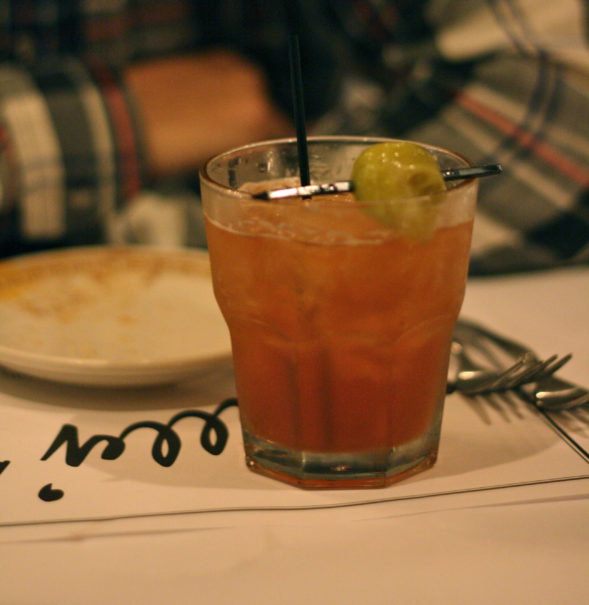
Finding Hope in an Old Fashioned Cocktail Garnished With A Pickled Mushroom

Finding Hope in an Old Fashioned Cocktail Garnished With A Pickled Mushroom
Old Fashioned in Green Bay, Wisconsin
Order an Old Fashioned at a Wisconsin supper club, and the bartender will ask you two questions: Whiskey or brandy? Sour or sweet?
Get it sour, and your muddled fruit, booze, and bitters will come drowned in Squirt soda. Order it sweet, and you’re upgrading to Sprite for a sugary drink that’s a world away from the minimalistic versions served in bars on either coast.
Wisconsin’s supper clubs are pure nostalgia, at least for some. From the piles of butter mints by the door to the vinyl seats, soft rock, and menus of meat and sides, the sweetest parts of supper clubs are a time warp to the 1970s.
But since American nostalgia for a whiter, straighter time swept a hateful and chaotic demagogue into the presidency, I can’t get much pleasure from my country’s heritage, even the bits that come spiked with whiskey. I skim right past the country music station on the radio, my love for twang and steel guitar overwhelmed by the bitter feeling that “heartland” culture is rotten at the core. It’s hard to imagine watching a classic Western when the ashes of the Standing Rock encampment are still smoldering.
Still, supper clubs offer a version of hope. Crack open the big, plastic-covered menus, and you’ll find a story more interesting than nostalgia ever was. Supper clubs are packed to the fake wood-paneled walls for each week’s Friday fish fry, a reminder of the days when Wisconsin’s Dutch and Polish Catholics abstained from meat on that day. And the best clubs—The Out of Town Club, Wally’s Spot—offer bars of pickled vegetables, fish, and turkey giblets that recall the region’s German and Scandinavian heritage. These days, Green Bay just seems like another white American city in the snowy north, but when my husband’s Dutch Catholic mother married his German Lutheran father, it challenged cultural boundaries (she converted before the wedding).
I wonder if his grandmother, who spoke German at the farm before she went to school, knew about the anti-German lynch mobs that formed in Wisconsin during World War I. Or if either side of the family—German or Dutch—were called “square heads” during recess, and what it was like for the children growing up in the Wisconsin towns of New Belgium, West Sweden, or Poland.
And did I say the bartender would ask two questions? After choosing the booze and the soda for your sticky-sweet drink, you still have one more choice to make: Wisconsin supper clubs garnish Old Fashioneds with a maraschino cherry, pickled mushroom, or pickled Brussels sprout—or even a funky combination of all three.
It’s a pleasingly weird selection that adds a bit of polka flair to the middle-American drinking scene. Even the cocktails are a reminder that culture, immigration, and xenophobia have always been thorny issues in the United States—but that sometimes we find a way to move on.